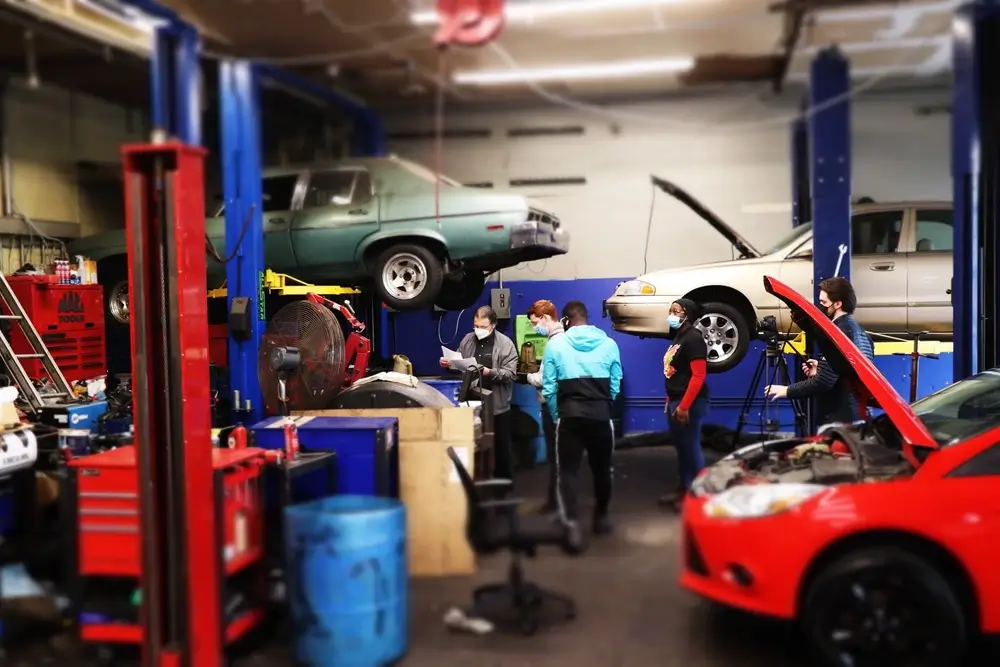
How Automotive Training Programs Help Build A Skilled Workforce?
With technological breakthroughs, the automotive industry is constantly changing, making it more crucial to have trained staff to keep up with the changes. As a result, programs for the automotive sector are created to give people the skills and information they need to succeed. These programs provide practical training and industry certifications and help with job placement to create a qualified workforce.
Hands-On Training
Hands-on training is one of the main advantages of automotive training programs. Many of these programs give students a chance to work with actual automobiles and automobile components and obtain real-world experience. Because it gives people a competitive edge in the job market and prepares them for life in the real world, this kind of training is priceless.
Industry Certifications
Industry certifications are an additional advantage of automotive mechanic training. The National Institute for Automotive Service Excellence (ASE) and other respected organizations offer credentials through several programs. These credentials show that a person has the knowledge and abilities to do the job well. In addition, industry certifications can result in improved pay and perks and expand work options.
Job Placement Assistance
Additionally, receiving an automotive technician certification helps graduates find employment. This help may come in the form of networking opportunities, resume writing services, and job fairs. This is crucial in the automobile sector, as networking and referrals are standard methods of employment acquisition. Training programs boost the likelihood that graduates will obtain jobs in the field by providing job placement support.
Continuing Education
People must keep up with the most recent developments in technology and methods since the automotive business is constantly changing. Therefore, numerous automotive schools provide continuing education courses, enabling students to increase their knowledge and stay updated with market developments. This kind of education is essential for people who wish to grow in their professions and assume leadership positions in the industry.
Technical Skills
Technical proficiency is a requirement for an automotive degree. These courses equip students with the technological know-how required to operate in the automobile sector by teaching them how to identify and fix vehicle issues. Graduates who acquire these abilities are prepared to take on demanding jobs and offer consumers high-quality service.
Soft Skills
Automotive programs acknowledge that soft skills are equally crucial to the industry as technical ones. Soft skills like communication, teamwork, and customer service are taught in these programs, ensuring that graduates are well-rounded and capable of cooperating successfully with coworkers and clients. Graduates who acquire these abilities are better equipped to meet the demands of the workplace and satisfy clients.
Safety Training
In automotive training programs, safety is of utmost importance. These programs ensure graduates are well-prepared to work safely in the sector by teaching them how to handle hazardous materials, operate machinery safely, and adhere to safety standards. Automotive training programs contribute to reducing workplace accidents and injuries by emphasizing safety.
Problem-Solving Skills
Automotive degrees are created to help students acquire these abilities because they are crucial in the automobile industry. These courses prepare students to function well in a demanding and dynamic environment by teaching them how to recognize and repair complicated vehicle issues. In addition, graduates who have mastered problem-solving techniques can better handle the intricate problems that arise in the automobile industry and offer consumers practical answers.
Automotive Technology
Automotive training programs stay current with the most recent technological developments as the automobile sector develops continuously. By ensuring that graduates are informed about the most recent technologies and trends, these programs increase their value to employers. In addition, graduates are prepared to deal with the newest and most cutting-edge vehicles and systems in the business since they keep up with the most recent technological developments.
Specialization
The certification of automotive technicians should emphasize specialization. Students can specialize in fields like diesel engines, transmission repair, or performance tuning through various curricula, increasing their value to companies. Graduates who specialize can stand out in a crowded job market and offer customers highly specialized services by specializing in a particular field. This enables graduates to seek professions that match their passions and interests.
Flexibility
Flexibility is an essential aspect of automotive technician training. Numerous programs include flexible timetables, making it more straightforward for students to finish the degree while maintaining a full-time job or caring for their families. Thanks to this flexibility, more people will have access to the training they need to pursue employment in the automotive industry. In addition, automotive training programs assist in lowering entrance barriers and presenting chances for people from diverse backgrounds by providing flexible scheduling.
Personalized Instruction
A crucial component of many automotive training programs is individualized instruction. With the help of professors who give each student their undivided attention, these programs let students learn at their speed. This strategy guarantees that pupils may comprehend the subject matter and effectively hone their automobile industry talents. In addition, automotive training programs foster a supportive learning environment that enables students to achieve and realize their full potential in the field by providing individualized teaching.
Conclusion
Automotive training programs play a critical role in building a skilled workforce in the automotive industry. They offer practical training, professional certificates, help finding employment, and ongoing education. By providing these resources, training programs ensure that graduates have the information and skills required to succeed in the sector. Additionally, they provide a pipeline of educated and skilled workers, which helps close the industry’s skills gap. Automotive training programs are crucial to developing a trained workforce to keep up with the changes as the automotive industry develops.



